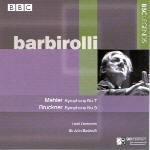Way back in 1960, John Barbirolli got together the combined Hallé and BBC Northern Symphony Orchestras and turned in this performance of Mahler’s then virtually unknown Seventh Symphony. Sure, it has its problems here and there: ensemble isn’t immaculate (the trumpets crack in all the expected places); the mandolin doesn’t play enough tremolos; it sounds like there’s only one cowbell (still attached to the cow); the cymbal player gets lost a few times; and Barbirolli’s tempos for the second Nachtmusik and finale are too slow (nor is the addition of a bass drum on the very last chord strictly necessary). But what lingers in the mind, particularly given the date of this performance, is just how good it actually is in terms of the conductor’s grasp of Mahler’s idiom, the enthusiasm of the players, and their pretty consistent technical achievement in putting the whole thing across (kudos particularly to the horns in the second movement). Unlike his recent, pretty terrible live Fourth Symphony, Barbirolli here is clearly in command of his forces, and the luxury of having additional players gives the whole interpretation a comfort level and freedom from strain lacking in many of his other “live” efforts. The interpretation, however odd in places, really does carry conviction and its own sense of rightness, particularly in the very cogently argued first two movements. If things start to fall apart and the players sound a bit tired in the finale, well, can you really blame them?
The Bruckner, however, is dreadful. The Hallé really was an unpolished ensemble, seldom if ever offering playing of genuine international caliber. The orchestra probably was more interesting for what Barbirolli could get its players to do than for the noises they made while doing it–and there were some things that they simply couldn’t handle in 1966. Bruckner seems to have been one of them. This performance is cruelly rushed, erratic, and badly executed. The third subject of the first movement, for example, proceeds at a tempo unrelated to anything else, and the string playing really stinks (ghastly cellos), especially where they need to sing (the first movement’s second subject, and long stretches of the adagio). The brass section offers tone of hideous coarseness and brutality, and at just shy of 21 minutes, the finale is as crudely and insensitively rendered as I have ever heard it. The orchestra truly sounds like a bad Salvation Army band with a few strings attached. If you want a savage approach in this music, there’s always Jochum on EMI. There you get all of Barbirolli’s excitement (and them some), but also great playing, fine sound, and a totally integrated, noble conception of the piece.
The BBC’s mono sound is clear, a bit overloaded at climaxes, but allows everything to be heard for better or worse. Barbirolli fans will want this as a matter of course. I think the set is worth it for the very interesting Mahler, and the rating reflects that performance only. I’ll pretend the Bruckner never happened, and I suggest that you do the same.
































